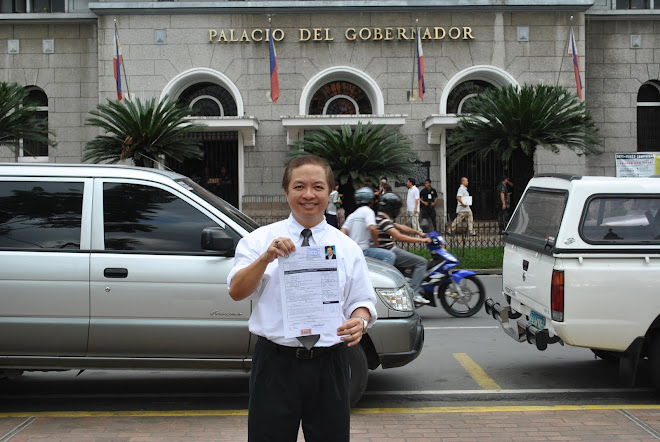Sunday, October 12, 2008
V.I.P. Jail
Editorial
Philippine Daily Inquirer
MANILA, Philippines - If Rizal were alive today, and writing the “Fili,” he may well begin by describing the social hierarchy inside the National Bilibid Prisons. Here, truly, can be found the ship of state, run aground.
Some convicts, rich or well-connected or both, live in special housing of their own, markedly different from the rest; the rest, most of them poor, share wretched, even inhuman conditions. Above them all sits a compromised management, partial to the powerful and protected by partisan politicians.
One thing the controversial and rashly rationalized release of double-murderer Claudio Teehankee Jr. has done is to remind the public, all over again, that justice is all too often not blind, that all too often the administration of justice does not only recognize but actively reinforces the difference between rich prisoners and poor. When Teehankee served his double life sentence (he was released after about 14 years), he lived in a rich man’s “kubol”—a special, customized detention area—isolated from non-privileged prisoners.
In his last days in Bilibid, Teehankee moved into the special quarters built by ex-congressman Romeo Jalosjos, convicted of raping a child but now enjoying the privilege of “living out” of prison in preparation for his eventual release. The Jalosjos “kubol” features a queen-size bed, a refrigerator, a private bathroom with hot and cold water and, not least, a 42-inch LCD television set with cable service.
According to an Inquirer source, as many as 6,000 “kubols” were constructed inside the maximum security area over the years, “with the permission of the NBP superintendent.”
Justice Secretary Raul Gonzalez admits the practice is a problem, but telegraphs an unwillingness or an inability to do anything about it. Instead, he rationalized the practice in characteristically outrageous terms. “High-profile inmates have threats. It is also fair to give them some exceptional security,” he said. “It is a difficult situation to mix them up with the other inmates …. Inmates tend to kill each other.”
By that token, every prisoner should be in solitary confinement!
But of course all Gonzalez meant by “high-profile” is “rich.” Rich or powerful prisoners are the only ones who can afford to construct special quarters (or buy one, in the case of the Jalosjos “kubol,” after he was done with it). Indeed, and as Gonzalez should know all too well, most victims of intra-prison violence are those who are decidedly low-profile: gang members who ran out of luck or convicts who have no money to pay for protection.
Why shouldn’t the government “allow” these likely victims a measure of “exceptional security”? Because they cannot afford it. That is what makes the special-quarters practice offensive. It renders the administration of justice unfair, and makes the application of the law’s heavy hand self-evidently uneven.
The chair of the Commission on Human Rights, noted election lawyer Leila de Lima, acknowledged that there may be nothing illegal in allowing inmates to construct improvements inside prison. “Nothing can prevent them from improving the facilities in prison, like the sports facilities, or adding more cells or rooms, or starting livelihood [projects] for other inmates. They can do that. That is laudable, in fact. That is the primary duty of the government, but it just can’t afford it.”
But: “What makes it objectionable is when they [build] special quarters [for themselves] while others do not.” Or, because of financial circumstance, cannot.
Philippine Daily Inquirer
MANILA, Philippines - If Rizal were alive today, and writing the “Fili,” he may well begin by describing the social hierarchy inside the National Bilibid Prisons. Here, truly, can be found the ship of state, run aground.
Some convicts, rich or well-connected or both, live in special housing of their own, markedly different from the rest; the rest, most of them poor, share wretched, even inhuman conditions. Above them all sits a compromised management, partial to the powerful and protected by partisan politicians.
One thing the controversial and rashly rationalized release of double-murderer Claudio Teehankee Jr. has done is to remind the public, all over again, that justice is all too often not blind, that all too often the administration of justice does not only recognize but actively reinforces the difference between rich prisoners and poor. When Teehankee served his double life sentence (he was released after about 14 years), he lived in a rich man’s “kubol”—a special, customized detention area—isolated from non-privileged prisoners.
In his last days in Bilibid, Teehankee moved into the special quarters built by ex-congressman Romeo Jalosjos, convicted of raping a child but now enjoying the privilege of “living out” of prison in preparation for his eventual release. The Jalosjos “kubol” features a queen-size bed, a refrigerator, a private bathroom with hot and cold water and, not least, a 42-inch LCD television set with cable service.
According to an Inquirer source, as many as 6,000 “kubols” were constructed inside the maximum security area over the years, “with the permission of the NBP superintendent.”
Justice Secretary Raul Gonzalez admits the practice is a problem, but telegraphs an unwillingness or an inability to do anything about it. Instead, he rationalized the practice in characteristically outrageous terms. “High-profile inmates have threats. It is also fair to give them some exceptional security,” he said. “It is a difficult situation to mix them up with the other inmates …. Inmates tend to kill each other.”
By that token, every prisoner should be in solitary confinement!
But of course all Gonzalez meant by “high-profile” is “rich.” Rich or powerful prisoners are the only ones who can afford to construct special quarters (or buy one, in the case of the Jalosjos “kubol,” after he was done with it). Indeed, and as Gonzalez should know all too well, most victims of intra-prison violence are those who are decidedly low-profile: gang members who ran out of luck or convicts who have no money to pay for protection.
Why shouldn’t the government “allow” these likely victims a measure of “exceptional security”? Because they cannot afford it. That is what makes the special-quarters practice offensive. It renders the administration of justice unfair, and makes the application of the law’s heavy hand self-evidently uneven.
The chair of the Commission on Human Rights, noted election lawyer Leila de Lima, acknowledged that there may be nothing illegal in allowing inmates to construct improvements inside prison. “Nothing can prevent them from improving the facilities in prison, like the sports facilities, or adding more cells or rooms, or starting livelihood [projects] for other inmates. They can do that. That is laudable, in fact. That is the primary duty of the government, but it just can’t afford it.”
But: “What makes it objectionable is when they [build] special quarters [for themselves] while others do not.” Or, because of financial circumstance, cannot.
Subscribe to:
Post Comments (Atom)










No comments:
Post a Comment